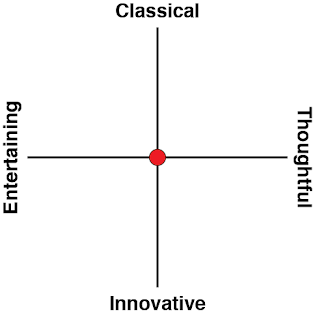For a while now at Digitally Downloaded, we’ve struggled to give games an accurate score, based on how we’ve reviewed them. There have been times that we’ve played games that have been wildly fun, but the lack of deeper meaning has meant we were not comfortable giving them really high scores – after all, we do try and treat games as works of art in our reviews, so a lack of artistry needed to be reflected in the score.
Conversely, we’ve given games that aren’t a great deal of fun to play very high scores because we’ve felt they were important, meaningful games. And this has confused some readers, who were really just looking for a fun game to play.
That’s why today we’re introducing what we call a Value Matrix to all of our reviews going forward. The Value Matrix will be used in addition to the 5-star scoring system, and looks a little like this:
As you can see, we’ve split two axes into four quadrants. On one axis we’ve got “Entertaining vs. Thoughtful”. On the other “Classical vs. Innovative.” With each review, we will position the game based on how it plays and the message it tells into one of those quadrants.
So, for example, if we were to look at a game like Three Fourths Home, which plays completely uniquely and is more interested in telling a story than being filled with action and excitement, then we would place it on the Value Matrix as such:
Meanwhile, a game like Call of Duty, which aims to be a blockbuster of an experience with a gameplay structure that is finely honed and typical for the genre, it would be placed on the Value Matrix as so:
And of course it’s possible for a game to sit in the middle of a category. A good example of that would be a game like Nier, which is certainly innovative in the way it plays and the story it tells, but it also seeks to straddle the middle ground between something entertaining to play, and something that has a message to share. A game like Nier would look like this:
With the Value Matrix, when we then give a score out of five, we score it in relation to the category that we’ve placed it in on the Matrix. In other words, when we score Call of Duty, we score it by comparison to all the other games that are in the Entertaining-Classical category. That means we can score it based on being a piece of blockbuster entertainment. When we score Three Fourths Home, we score it as a Thoughtful-Innovative game. It’s not trying to be a blockbuster, so it doesn’t need to be rated that way.
The purpose of the Value Matrix is to help give all readers a quick view sense of what kind of experience a game provides, and then highlight at a glance what kind of experience we’ve scored. It’s designed to be a more granular scoring system than having a standards stars system, and we hope it’s of use to you in deciding if a game would be of interest to you or not!
Let us know if you have any questions, but we think this system will be self explanatory and helpful once you see it in action!
– Matt and the DDNet team.











